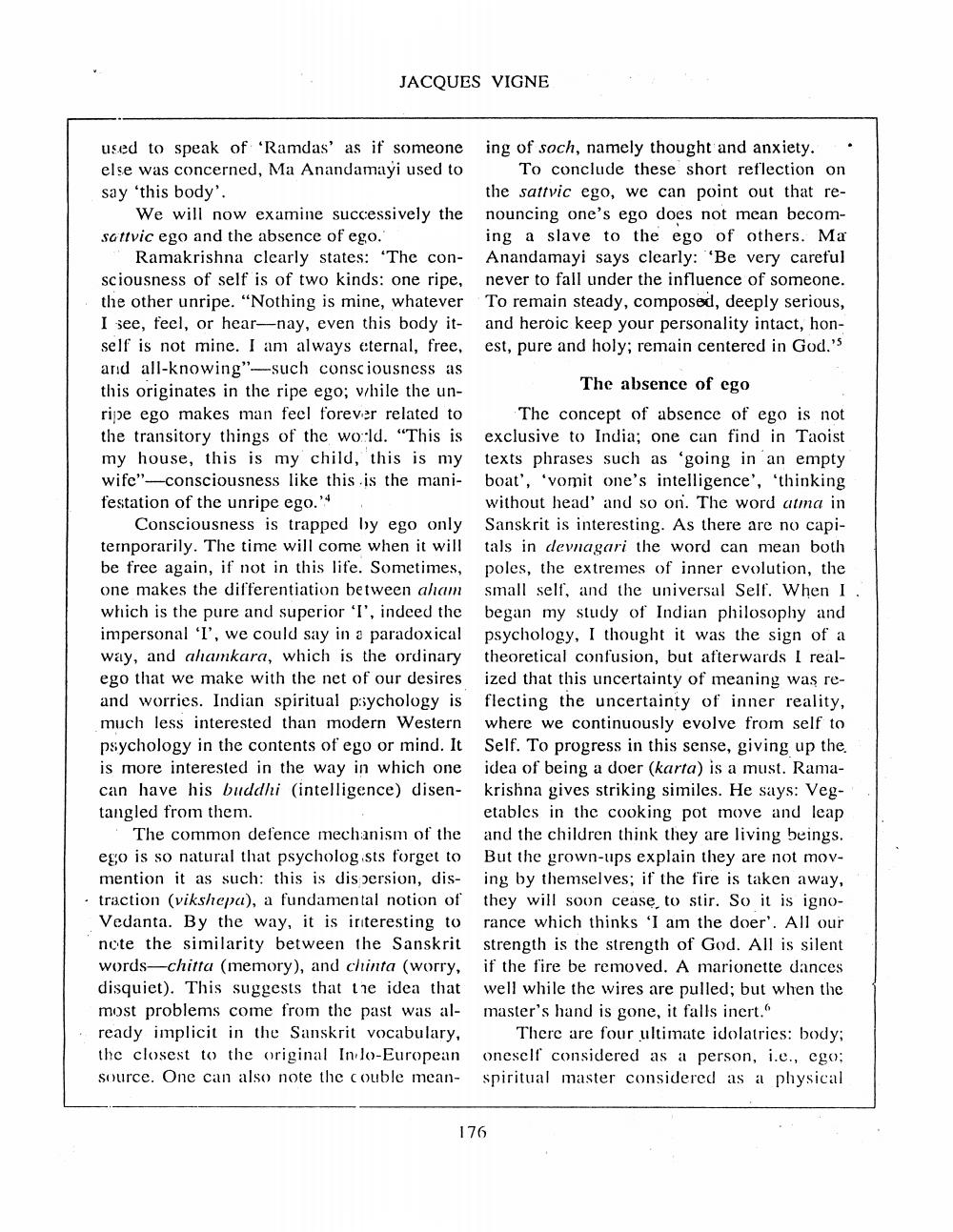________________
JACQUES VIGNE
ing of soch, namely thought and anxiety.
used to speak of 'Ramdas' as if someone else was concerned, Ma Anandamayi used to say 'this body'.
To conclude these short reflection on the sattvic ego, we can point out that re
We will now examine successively the nouncing one's ego does not mean becomsattvic ego and the absence of ego. ing a slave to the ego of others. Ma Anandamayi says clearly: 'Be very careful never to fall under the influence of someone. To remain steady, composed, deeply serious, and heroic keep your personality intact, honest, pure and holy; remain centered in God.'s
Ramakrishna clearly states: 'The consciousness of self is of two kinds: one ripe, the other unripe. "Nothing is mine, whatever I see, feel, or hear-nay, even this body itself is not mine. I am always eternal, free, and all-knowing"-such consciousness as this originates in the ripe ego; while the unripe ego makes man feel forever related to the transitory things of the world. "This is my house, this is my child, this is my wife"-consciousness like this is the manifestation of the unripe ego."
Consciousness is trapped by ego only temporarily. The time will come when it will be free again, if not in this life. Sometimes, one makes the differentiation between aham which is the pure and superior 'I', indeed the impersonal 'I', we could say in a paradoxical way, and ahamkara, which is the ordinary ego that we make with the net of our desires and worries. Indian spiritual psychology is much less interested than modern Western psychology in the contents of ego or mind. It is more interested in the way in which one can have his buddhi (intelligence) disentangled from them.
The common defence mechanism of the ego is so natural that psychologists forget to mention it as such: this is dispersion, dis⚫ traction (vikshepa), a fundamental notion of Vedanta. By the way, it is interesting to note the similarity between the Sanskrit words-chitta (memory), and chinta (worry, disquiet). This suggests that the idea that most problems come from the past was already implicit in the Sanskrit vocabulary, the closest to the original Indo-European source. One can also note the couble mean
The absence of ego
The concept of absence of ego is not exclusive to India; one can find in Taoist texts phrases such as 'going in an empty boat', 'vomit one's intelligence', 'thinking without head' and so on. The word atma in Sanskrit is interesting. As there are no capitals in devnagari the word can mean both poles, the extremes of inner evolution, the small self, and the universal Self. When I began my study of Indian philosophy and psychology. I thought it was the sign of a theoretical confusion, but afterwards I realized that this uncertainty of meaning was reflecting the uncertainty of inner reality, where we continuously evolve from self to Self. To progress in this sense, giving up the idea of being a doer (karta) is a must. Ramakrishna gives striking similes. He says: Vegetables in the cooking pot move and leap and the children think they are living beings. But the grown-ups explain they are not moving by themselves; if the fire is taken away, they will soon cease to stir. So it is ignorance which thinks I am the doer'. All our strength is the strength of God. All is silent if the fire be removed. A marionette dances well while the wires are pulled; but when the master's hand is gone, it falls inert."
There are four ultimate idolatries: body; oneself considered as a person, i.e., ego; spiritual master considered as a physical
176




